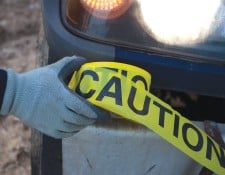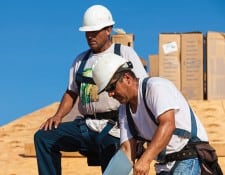No matter how prepared and responsible everyone is on a jobsite, there is still a chance that an accident could happen. Whether the situation is a result of human or equipment error or the outcome of a severe weather event, there are some basic crisis management tips to keep in mind as you manage the unexpected.
1. Put Safety First
 As soon as an accident happens, your first responsibility is to immediately asses if there are injuries and if there is imminent danger to others. If so, contact the proper authorities immediately and keep a line of communication open with your crew and the homeowner. Prevent accidents and injuries ahead of time by ensuring that your crew has been properly trained on safety, and that you and your job foreman are up-to-date on safety rules and regulations.
As soon as an accident happens, your first responsibility is to immediately asses if there are injuries and if there is imminent danger to others. If so, contact the proper authorities immediately and keep a line of communication open with your crew and the homeowner. Prevent accidents and injuries ahead of time by ensuring that your crew has been properly trained on safety, and that you and your job foreman are up-to-date on safety rules and regulations.
2. Actively Communicate
When something goes wrong, it’s important to gather as much accurate information about what happened as possible. Make a communication plan to ensure everyone is on the same page. Your communication plan is a document that can help guide you if an accident happens and should include details like:
- A list of everyone who needs to be informed of any updates from the situation, such as the homeowners or your crew, and who will be in charge of contacting them
- Contact information for your clients and crew, so you can easily get in touch
- Potential questions reporters may ask you about the situation and your answers, so that you can consistently respond with accurate information
- The name and contact information for the spokesperson who will respond to calls from reporters. This person could be the owner of your company
or another trusted employee - The process for how homeowners should handle media questions if they receive them. For example, direct homeowners to contact you or the spokesperson handling media inquiries
3. Keep the Homeowner Informed
 Be clear and honest with the homeowner about what happened. Let them know how the accident impacted the project and its timeline. Have a plan for how you’re going to resolve the situation, and make sure they understand the details and are comfortable with the updates. Be sure to have an open line of communication and promptly return all phone calls. You want to continue to have the homeowner’s trust, and one of the best ways to do that is by being as transparent and helpful as possible.
Be clear and honest with the homeowner about what happened. Let them know how the accident impacted the project and its timeline. Have a plan for how you’re going to resolve the situation, and make sure they understand the details and are comfortable with the updates. Be sure to have an open line of communication and promptly return all phone calls. You want to continue to have the homeowner’s trust, and one of the best ways to do that is by being as transparent and helpful as possible.
4. Stick to the Facts
If the accident is significant enough to attract media attention, you may be contacted for more information. If you are, decide if you’ll release a statement or agree to answer some questions. If you agree to answer questions, put together a few talking points in advance of the interview to make sure you or the spokesperson you identify is prepared with what they should (or should not) say. It’s also helpful to write down some of the easy (and perhaps difficult) questions you think you could be asked, so that you can work through your responses before the interview.
And remember, nothing is ever “off the record.”
- Don’t say anything in front of a reporter that you don’t want printed in a newspaper or shared during a newscast
- Avoid using the phrase “no comment,” as it often implies guilt. Instead, provide a reason for why you can’t answer. For example: “I can’t provide that information because the incident is currently under investigation. We’ll let you know when we have all the facts.”
- Be sympathetic to the situation and focused on making it right
- Only share verified facts and don’t speculate about what might have happened
- If an investigation is taking place, direct any specific questions about the incident to the authorities
5. Learn From the Accident
No matter what happened, learn from the accident and take the necessary steps to ensure that it won’t happen again. Share your learnings with your crew and provide them with appropriate training, so they can be diligent about safety. Check the ABC Supply Catalog for gear that can help keep you and your crew safe.
Want more business tips? Visit our blog.